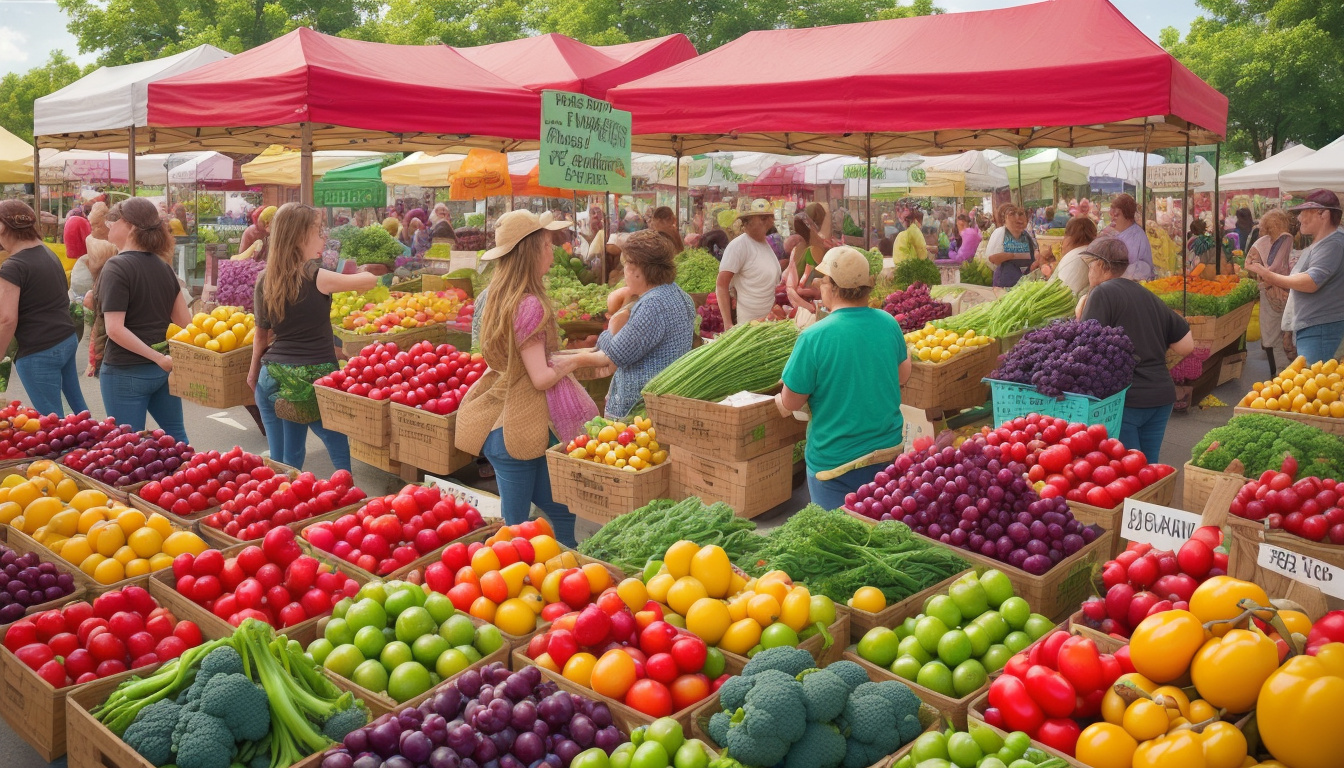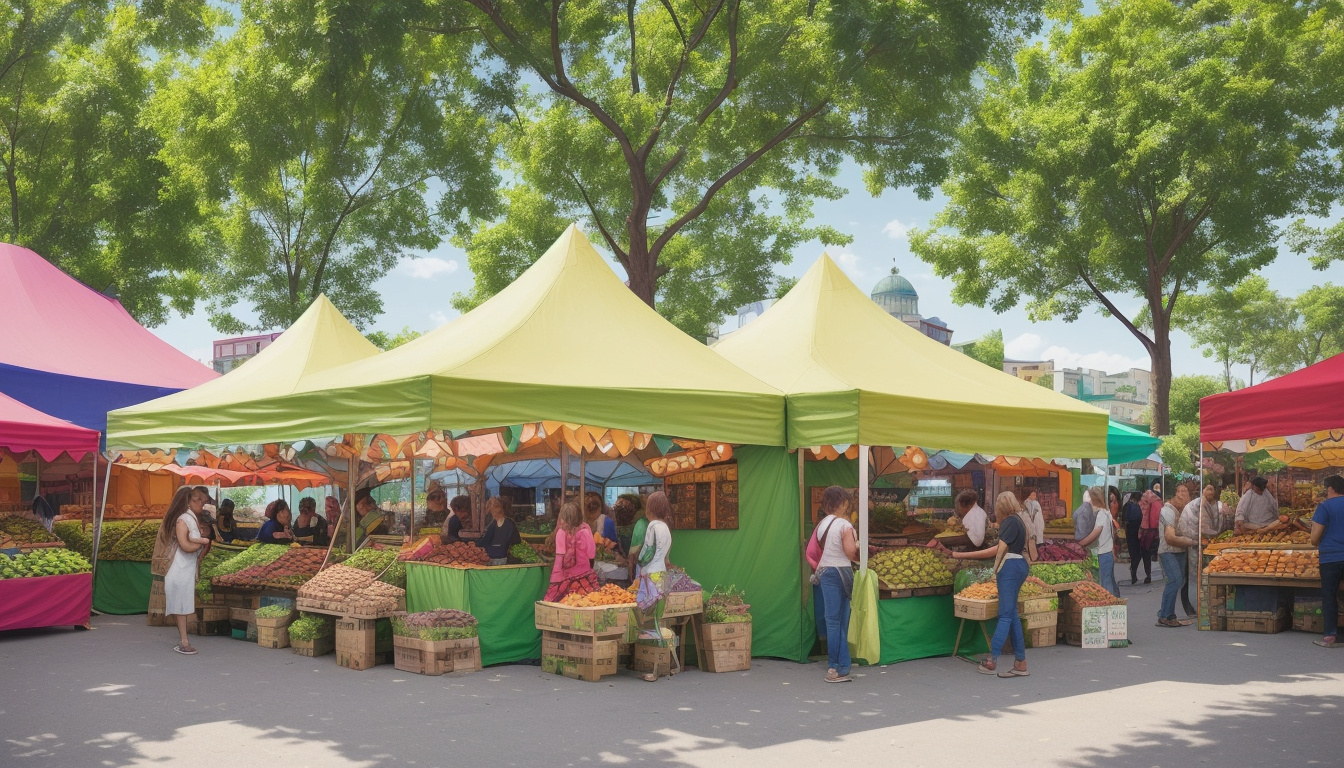The Power of Food Hubs: Your Guide to Sustainable Local Eating

Have you ever wondered about the journey your food takes before it reaches your plate? In a world where eating locally and sustainably is becoming more and more important, food hubs are stepping into the spotlight.
But what exactly are food hubs, and how can they transform the way we think about food? In this guide, we'll dive into the essence of food hubs, why they matter, and how you can effortlessly integrate them into your lifestyle. Whether you're a health enthusiast, farmer, or just someone looking to support local, this article will equip you with all the knowledge you need to unlock the power of food hubs!
Interested in our Digital Magazine APP?

Here's a thought
- Food hubs are centralized locations that aggregate and distribute locally produced food.
- Supporting local food systems through food hubs strengthens community economies and reduces environmental impact.
- Food hubs offer numerous benefits, including fresher produce and shorter supply chains.
- Finding a food hub nearby can enhance your diet with seasonal and diverse food options.
- The future of food hubs is promising, contributing to sustainable eating practices and food equity.
What are Food Hubs?
When we talk about food hubs, we’re really diving into a vibrant network of resources designed to connect local farmers with consumers, making it easier for everyone to access fresh, nutritious food. But what exactly are food hubs? Simply put, food hubs are businesses or organizations that manage the aggregation, distribution, and marketing of local food products, helping to bring farm-fresh goods directly to those who crave them.
They vary in size and form, ranging from small farm cooperatives to larger regional distributors, but their primary goal remains the same: to support local agriculture and create a sustainable food ecosystem. For health enthusiasts, food hubs are a fantastic way to ensure you're consuming quality produce while also supporting local farmers.
Plus, by participating in this system, you’re contributing to a healthier planet by reducing transportation emissions and promoting biodiversity. So, whether you’re looking to boost your health, support your community, or just enjoy some of the best locally-sourced foods, exploring food hubs is an excellent option!
The Importance of Local Food Systems
When we think about the importance of local food systems, food hubs play a pivotal role in connecting consumers, health enthusiasts, and farmers. These hubs are essential platforms that aggregate, distribute, and market local produce, allowing for a more sustainable food system that benefits all involved. By sourcing food directly from farmers, food hubs not only support local economies but also ensure that consumers have access to fresh, nutritious options. For health enthusiasts, this means knowing exactly where your food comes from, making it easier to make informed choices about your diet. And let's not forget about farmers—food hubs enable them to reach a larger market without the high costs associated with traditional distribution methods. In essence, food hubs are not just a trend; they are a vital piece of the puzzle in creating resilient and sustainable local food systems.
'You are what you eat, so don’t be fast, cheap, easy, or fake.' - Unknown
Benefits of Supporting Food Hubs
When it comes to supporting local agriculture and promoting sustainable practices, food hubs play an indispensable role. These community-driven enterprises connect farmers directly with consumers, cutting out the middleman and ensuring that fresh, healthy produce reaches your table without unnecessary delays or markups. For health enthusiasts, this means access to higher-quality ingredients that are often pesticide-free and harvested at peak ripeness.
Farmers benefit too, as food hubs provide them with better market access and fair pricing, empowering them to grow and diversify their crops. By engaging with food hubs, you’re not only making a conscious choice for your health but also supporting local economies and fostering a resilient food system that benefits everyone in the community. So, next time you’re shopping for groceries, consider reaching out to your local food hubs – you’ll be amazed at the delicious options they offer!
Interested in our Digital Magazine APP?

How to Find and Choose a Food Hub Near You
Finding the right food hub can make a world of difference in your access to fresh, local produce and sustainable food options. To start, begin by researching the food hubs in your area—these are community-driven organizations that connect consumers directly with farmers and local food producers. Websites like LocalHarvest or the USDA’s Food Hub Database are great resources for this.
When choosing a food hub, consider the types of products they offer, such as organic vegetables, pasture-raised meats, and artisanal goods, and check if they align with your dietary preferences or health goals. Don't forget to read reviews or ask for recommendations within community groups on social media.
Many food hubs also host events, which can be a fantastic opportunity to meet local farmers and learn more about sustainable practices. With a little research, you can find a food hub that not only supports your health enthusiast lifestyle but also helps local farmers thrive!
Tips for Incorporating Food Hub Products into Your Diet
Are you looking to elevate your meals with fresh, local ingredients? Incorporating products from food hubs into your diet is a fantastic way to support local farmers while enjoying the many health benefits of fresh produce! Start by visiting your local food hub to explore what's in season. Many food hubs offer a variety of fruits, vegetables, and artisanal products that can elevate even the simplest meals. Try adding seasonal veggies into your salads or smoothies for an antioxidant boost, or explore unique grains and legumes sourced from nearby farmers for a nutritious base in your meals.
Additionally, don’t forget to check out specialty items like homemade jams or local honey to add a gourmet touch to your breakfasts. By intentionally incorporating food hub products into your diet, you’re not only eating healthier but also connecting with your community and contributing to sustainable agriculture initiatives. So, why not make a visit to your nearest food hub this week and taste the difference fresh, local ingredients can make?
Here's something people ask about
What are food hubs?
Food hubs are centralized places that connect local farmers with consumers, facilitating the distribution and sale of locally grown food. They serve as a bridge between food producers and those looking for fresh, sustainable food options.
Why are local food systems important?
Local food systems reduce the carbon footprint associated with transporting food over long distances, support local economies, and provide consumers with fresher produce. They also strengthen community ties and promote sustainable farming practices.
What are the benefits of supporting food hubs?
Supporting food hubs enhances community resilience, boosts local economies, and encourages sustainable agricultural practices. Consumers benefit from access to fresh, seasonal produce while knowing their purchases directly support local farmers.
How can I find a food hub near me?
You can find food hubs in your area by searching online directories, visiting local farmers' markets, or checking with local agricultural organizations. Many cities have websites dedicated to promoting local food initiatives.
What are some tips for incorporating food hub products into my diet?
Start by planning your meals around what is in season and available at your local food hub. Experiment with new recipes that highlight local ingredients, and consider joining a community-supported agriculture (CSA) program for regular access to fresh produce.
We're striving to bring a range of different topics that relate to the Farming Food & Health sector. If you've got a question, please feel free to contact us.
We publish a quarterly magazine available in IOS, Android and Web reader. Stories and articles curated from amazing people all around the world.



